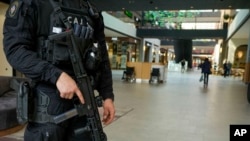Italy followed France on Monday in stepping up security following the attack on a suburban Moscow concert hall and the claim of responsibility by an affiliate of the Islamic State group.
The attack renewed attention in Europe on the risk from extremists, and particularly the Central Asian affiliate, as the continent gears up for big events such as the Paris Olympics and the European Championship in Germany.
France on Sunday increased its security alert posture to the highest level. In Italy, a national security council meeting Monday resulted in a decision to increase security around Holy Week observances leading up to Easter this weekend.
Both surveillance and checks will be increased, “paying the most attention to the places of greatest aggregation and transit of people, as well as sensitive targets,’’ the Italian Interior Ministry said in a statement. Pope Francis has a busy schedule of events in Rome and at the Vatican in the days leading up to Easter Sunday.
In Germany, Interior Ministry spokesperson Cornelius Funke said the threat from Islamic extremists “remains acute” but authorities’ risk assessment hasn’t changed so far as a result of the Moscow attack.
In Serbia, secret police officers with machine guns were seen patrolling the streets of Belgrade over the weekend. President Aleksandar Vucic said they and plainclothes police would monitor sports venues and shopping malls in the capital. The measure was criticized by Vucic’s opponents as unnecessary and designed to scare the population.
An affiliate of the Islamic State group variously as ISIS-K, IS-K or ISPK claimed responsibility for the Moscow attack, a claim that U.S. and other Western officials have confirmed. The affiliate has repeatedly carried out attacks in Afghanistan since the Taliban seized power in 2021.
It was behind the August 2021 suicide bombing at Kabul airport that left 13 American troops and about 170 Afghans dead during the chaotic U.S. withdrawal. It also claimed responsibility for a bomb attack in Kerman, Iran, in January that killed 95 people at a memorial procession.
But it also has been active and on authorities’ radar in Europe.
IS-K, which the German Interior Ministry’s Funke said “is to our knowledge the most aggressive IS affiliate at present,” has been linked by German authorities to three alleged plots since July.
Those include an alleged plan that prompted authorities to step up security at Cologne Cathedral over Christmas and, most recently, the arrest last week two Afghan men accused of planning to attack police near the Swedish parliament in response to the burning of copies of the Quran, the Muslim holy book.
French President Emmanuel Macron said Paris has intelligence pointing to “an IS entity” as responsible for the Moscow attack and that the group is believed to be involved in several attempted attacks in recent months in France.
He didn’t specifically name IS-K but said during a trip to French Guiana that was why France raised its security alert as a “precautionary measure.”

